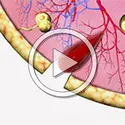HÉMOPHILIE
Article modifié le
Bibliographie
D. Alagille, « Hémophilies classiques, hémophilies latentes », in Le Concours méd., t. XCII, no 8, 1970
R. Biggs & R. G. Mac-farlane, Human Blood Coagulation and Its Disorders, Oxford, 3e éd. 1962
R. de Biasi, A. Rocino, E. Miraglia, L. Mastrullo & A. A. Quirino, « The Impact of a Very High Purity Factor VIII Concentrate on the Immune System of Human Immunodeficiency Virus-Infected Hemophiliacs : a Randomized, Prospective, Two-year Comparison with an Intermediate Purity Concentrate », in Blood, vol. LXXVIII, 1991
A. L. Bloom, « Progress in the Clinical Management of Haemophilia », in Thromb. Haemost., vol. LXVI, no 1, 1991
R. Bourdon, J. Bernard, J. Caen, M. Bard & C. Patrux, « Données évolutives des lésions ostéo-articulaires radiologiques de l'hémophilie », in Semaine des hôpitaux, t. XXXIX, 1963
K. M. Brinkhous, The Hemophilias, Chapel Hill, 1964
W. Bulloch & P. Fildes, Haemophila : the Treasury of Human Inheritance, part. V et VI, sect. XIV a, Londres, 1911
K. H. Choo, K. G. Gould, D. J. Rees & G. G. Brownlee, « Molecular Cloning of the Gene for Human Anti-Haemophilic Factor IX », in Nature, vol. CCXCIX, 1982
J. Gitschier, W. I. Wood, T. M. Goralka et al., « Characterization of the Human Factor VIII Gene », in Nature, vol. CCCXII, 1984
R. M. Hardisty & G. I. C. Ingram, Blooding Disorders. Investigation and Management, Oxford, 1965
M. W. Hilgartner, « The Need for Recombinant Factor VIII : Historical Background and Rationale », in Semin. Hematol., vol. XXVIII, no 2, 1991
B. Horowitz, M. E. Wiebe, A. Lippin, J. Vandersande & M. H. Stryker, « Inactivation of Viruses in Labile Blood Derivatives. I. Disruption of Lipid-enveloped Virus by Tri (n-butyl) Phosphate Detergent Combinations in Transfusion », in Transfusion, vol. XXV, 1985
C. K. Kasper, « Treatment of Factor VIII Inhibitors », in Coller BS, éd. Progress in hemostasis and thrombosis, vol. IX, W. B. Saunders, Philadelphie, 1989
C. K. Kasper, J. M. Lusher & The Transfusion Practices Committee, « Recent Evolution of Clotting Factor Concentrates for Hemophilia A and B », in Transfusion, vol. XXXIII, no 5, 1993
J. M. Lusher, S. Arkin, C. F. Abildgaard, R. S. Schwartz & The Kogenate Previously Untreated Patient Study Group, « Recombinant Factor VIII for the Treatment of Previously Untreated Patients with Hemophilia A : Safety, Efficacy and Development of Inhibitors », in N. Engl. J. Med., vol. CCCXXVIII, no 7, 1993
J. C. Otto, « An Account of an Haemorragic Disposition Existing in Certain Families », in Med. Repository, vol. VI, 1803
A. J. Patek & F. H. L. Taylor, « Haemophilia II. Some Properties of a Substance Obtained from Normal Human Plasma Effective in Accelerating the Coagulation of Haemophilic Blood », in J. clin. Invest., vol. XVI, 1937
A. Pavlovsky, « Contribution to the Pathogenesis of Haemophilia », in Blood, vol. II, 1947
Plasma Fractions for the Treatment of Haemophilia, Stuttgart-New York, 1969
F. Rosner, « Haemophilia in the Talmud and Rabbinic Writings », in Ann. int. Med., vol. LXX, 1969
J. P. Soulier & F. Josso, « Données nouvelles sur l'hémophilie », in Bibliotheca haematologica, t. XXVI, 1966.
La suite de cet article est accessible aux abonnés
- Des contenus variés, complets et fiables
- Accessible sur tous les écrans
- Pas de publicité
Déjà abonné ? Se connecter
Écrit par
- Édith FRESSINAUD : docteur en médecine, docteur ès sciences, directeur adjoint du Centre de transfusion d'Angers
- Dominique MEYER : professeur à l'université de Paris-XI, chef du service d'hématologie à l'hôpital Antoine-Béclère, directeur de l'unité 143 de l'I.N.S.E.R.M.
Classification
Média
Autres références
-
HÉMORRAGIES
- Écrit par Encyclopædia Universalis et Jean-Pierre SOULIER
- 4 291 mots
- 4 médias
L' hémophilie représente le type des syndromes hémorragiques constitutionnels par défaut congénital d'un facteur de coagulation. Tare récessive liée au sexe, elle frappe les sujets masculins et se transmet par les femmes qui sont cliniquement indemnes. Biologiquement, on distingue deux types d'hémophilie... -
TRANSFUSION SANGUINE
- Écrit par Jean-Pierre SOULIER
- 2 452 mots
...prothrombique et facteur IX), préparé pour la première fois en France sous le nom de P.P.S.B. Les concentrés de facteur VIII sont utilisés pour le traitement de l' hémophilie A (85 p. 100 des hémophilies). Ces concentrés sont de plus en plus purifiés, et, depuis peu, on dispose de facteur VIII recombinant. Le P.P.S.B....
Voir aussi
- CONTAMINATION
- COAGULATION DU SANG
- HÉRÉDITAIRES MALADIES ou MALADIES GÉNÉTIQUES
- ECCHYMOSE
- ANTICOAGULANTS CIRCULANTS
- HÉMOSTASE
- HÉMORRAGIQUES SYNDROMES
- PLASMA SANGUIN
- PURIFICATION, physico-chimie
- ARTHROPATHIE
- NÉO-MUTATIONS, génétique
- ANTICORPS
- RÉCESSIVITÉ, génétique
- HÉMARTHROSE
- HÉRÉDITÉ LIÉE AU SEXE
- COAGULOPATHIES
- DIAGNOSTIC PRÉNATAL
- ANTÉNATOLOGIE
- HÉPATITE VIRALE
- TEMPS DE COAGULATION
- FACTEURS DE COAGULATION SANGUINE
- HÉMOPATHIES
- DÉPISTAGE, médecine
- VIH (virus de l'immunodéficience humaine) ou HIV



